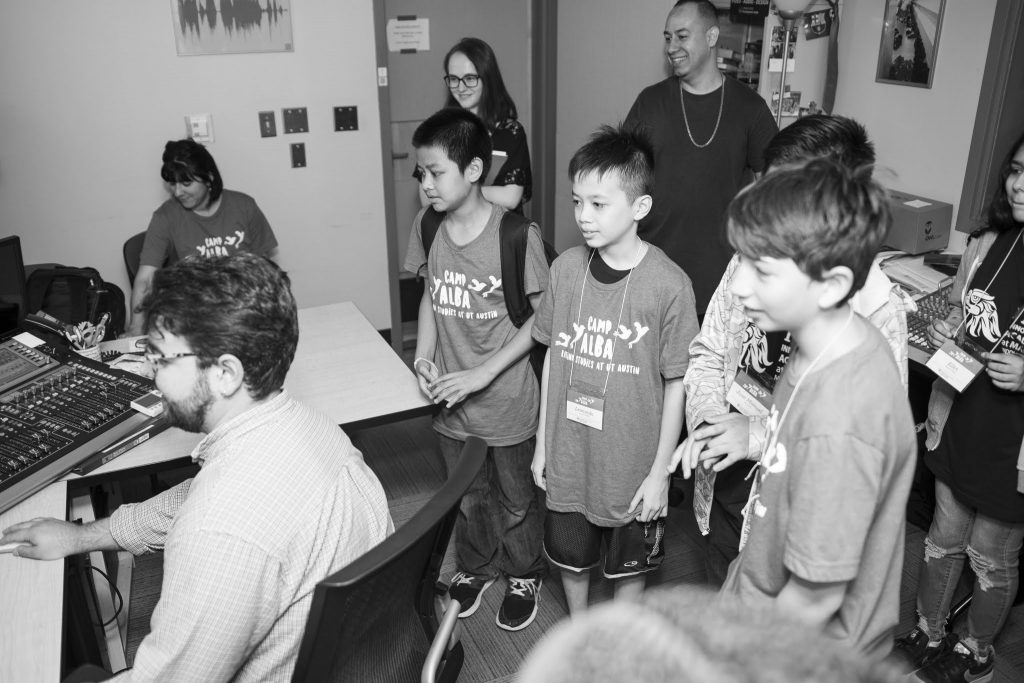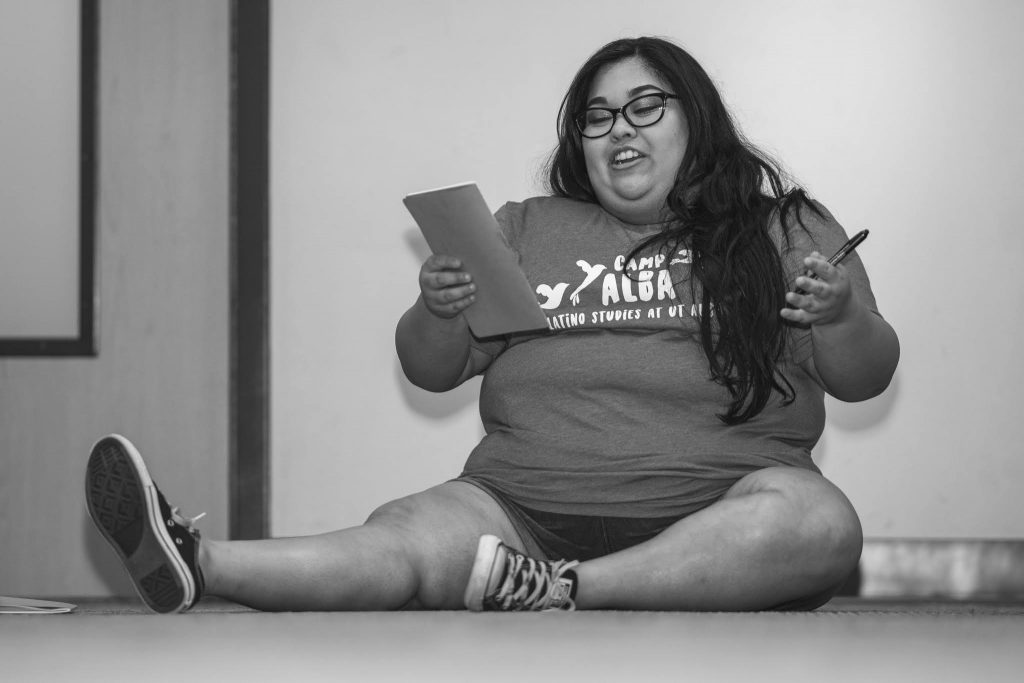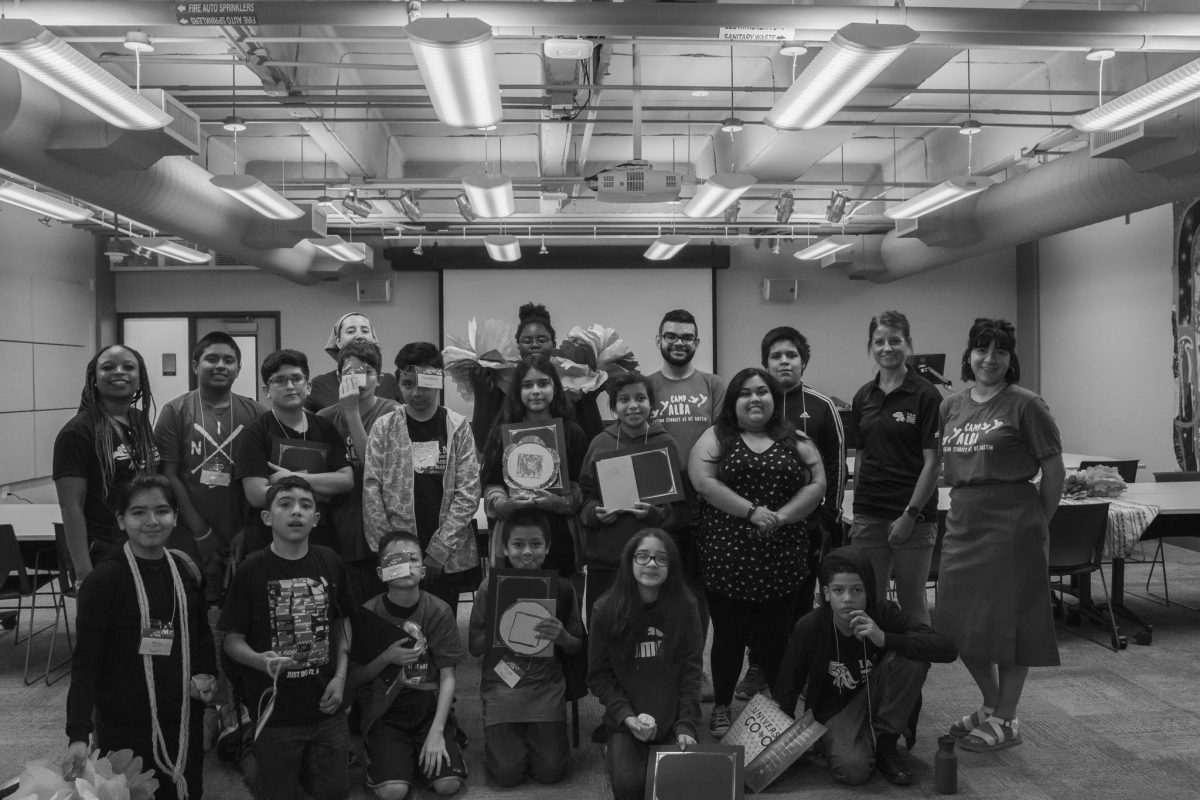After spending three days on the University of Texas at Austin campus, sixth graders from Martin Middle School left with a greater sense of connection to their communities and their first single track, produced by hip-hop artist and activist Olmeca.
Latino Studies at UT Austin invited a group of the school’s incoming sixth-graders to participate in Camp Alba, a three-day camp designed to prepare young, underserved students for academic success by introducing them to role models with whom they can identify and exposing them to ethnic studies curriculum through humanities-based activities and the art of self-expression.
“We really want to demystify UT for these young students,” says the camp’s director Karma Chavez, chair of the Department of Mexican American and Latina/o Studies at UT Austin. “We want them to know that they can have a place at college, and we want them to come out with a meaningful experience that has taught them about the history and culture of Latinx people.”
In designing the camp’s programming, Latino Studies’ staff and faculty wanted the students’ parents to be encouraged by what the camp could offer and to provide students with the tools and education they need to come into their own identities.
“One particular challenge was figuring out how to represent ethnic studies to students who, at that age, aren’t necessarily thinking about their ethnic identity in the ways that college students are,” Mallory Laurel, communications and outreach coordinator for Latino Studies, considers. “How do we introduce concepts that are commonplace in our curriculum in a way that’s eye-opening, not alarmist; that’s encouraging, not debilitating?”
To do this, the students partook in camp activities such as ‘alternative’ history lessons, which emphasized the roles of people of color throughout history, and creative writing, where they expressed their own life experiences and looked deeper into what heritage means to them.

The students then had the chance to record their written stories through spoken word with musical backgrounds and guidance from hip-hop artist and activist Olmeca, who has used his platform to encourage people to use music to express themselves.
“We all want to tell our stories,” Olmeca explains. “That’s implanted in all of us, so it’s just about finding your tools.”
While helping the students record at the studio, Olmeca focused less on rhythm and accuracy and more on the creative process: From having a thought, to putting it down on paper, to coming into the studio and recording it. He explained to the students that even though it may seem like a long way from point A to Z, each step is equally important as the last.
Olmeca also noted how Camp Alba gives students experiences that he wished he had and how vital it is, from a young age, to know that representation matters.
“I think folks of color, and marginalized people in general, are more holistic because struggle teaches us to be, though struggle is oftentimes not valued as an asset,” Olmeca offers. “I believe that when you have barriers in front of you, and you overcome them, you become twice as valuable.”
The students’ teacher, Raquel Johnson, shared his sentiments, adding that Camp Alba teaches the kids important lessons about themselves and what they’re capable of.
“Coming from humble beginnings, the kids are accustomed to what’s in their community,” Johnson explains. “Camp Alba gives them a chance to explore and think outside that bubble. It’s also giving them a chance to become leaders and learn how to advocate for things that are going wrong in the world, showing them that their voices matter.”

Johnson appreciates the camp’s approach to pulling students out of their own heads by incorporating group work and writing into most of the camp’s activities. By giving the kids hands-on activities in a college environment, Camp Alba encourages them to share in these experiences with each other as well as discover what educational goals they should set for themselves.
In reflecting on what she hopes the students take away from Camp Alba, Laurel emphasizes the importance of courage in the classroom and the willingness to challenge the status quo when it comes to Latinx representation: “The difference between a good student and a great one often seems to be the willingness to intellectually tread where others have or will not.”
